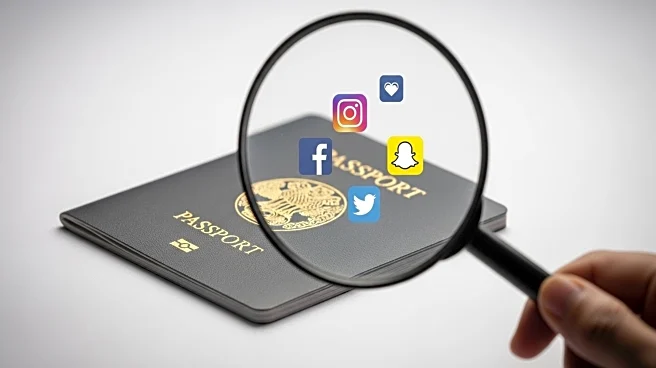What is the story about?
What's Happening?
Several Indian students have been denied U.S. visas following a new social media screening policy implemented by the Trump administration. The policy requires visa applicants to allow American authorities to review their online presence. Students like Kaushik Raj, who had secured scholarships to prestigious U.S. universities, were rejected despite completing all other application stages. The rejections were attributed to insufficient ties to India, although students suspect their social media activity played a role. The policy change has led to increased administrative processing times and uncertainty for international students, who now face the challenge of navigating visa applications under heightened scrutiny.
Why It's Important?
The new social media screening policy has significant implications for international students seeking education in the U.S. It introduces additional hurdles in the visa application process, potentially deterring students from pursuing studies in the country. The policy could impact the U.S.'s reputation as a destination for higher education, as students may opt for other countries with less stringent requirements. The scrutiny of social media activity raises concerns about privacy and freedom of expression, as students may feel pressured to self-censor to avoid visa rejections. This development could affect the diversity and global engagement of U.S. academic institutions.
What's Next?
The policy may lead to further legal challenges and diplomatic discussions, as affected students and educational institutions seek clarity and fairness in the visa application process. Advocacy groups and immigration lawyers may push for policy revisions to ensure that social media scrutiny does not infringe on privacy rights or disproportionately affect certain groups. The situation could prompt universities to offer more support to international students navigating visa challenges. Additionally, the policy's impact on U.S.-India educational exchanges may become a topic of bilateral discussions, as both countries assess the implications for academic collaboration.
Beyond the Headlines
The social media screening policy reflects broader trends in immigration and national security measures, highlighting the intersection of technology and governance. It raises ethical questions about the extent to which personal online activity should influence visa decisions and the potential for discrimination based on political views or activism. The policy may contribute to a climate of fear and self-censorship among international students, affecting their ability to engage freely in academic and social discourse. Long-term, this could influence global perceptions of the U.S. as a welcoming environment for international scholars.















